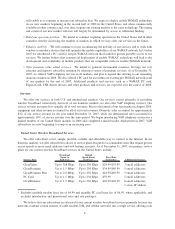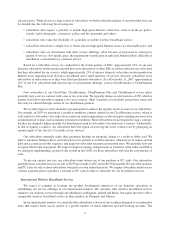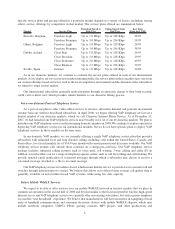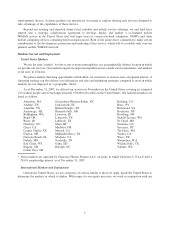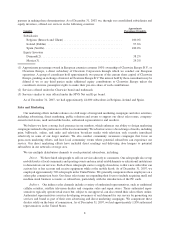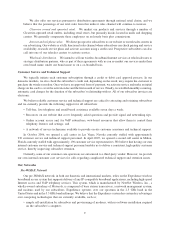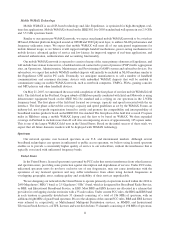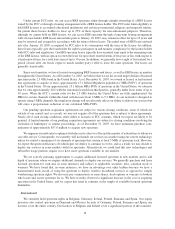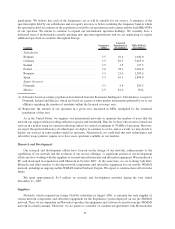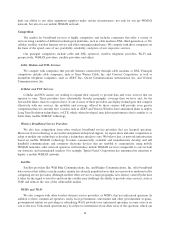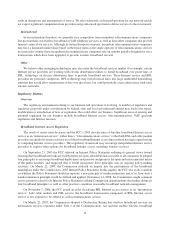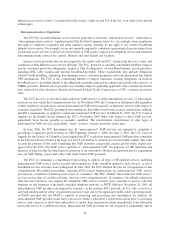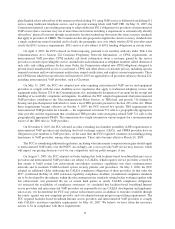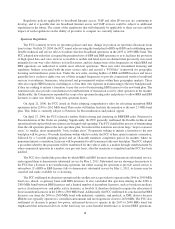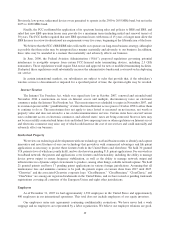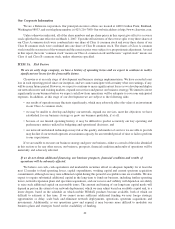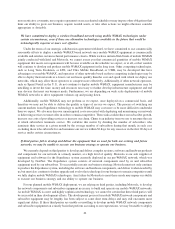Clearwire 2007 Annual Report Download - page 20
Download and view the complete annual report
Please find page 20 of the 2007 Clearwire annual report below. You can navigate through the pages in the report by either clicking on the pages listed below, or by using the keyword search tool below to find specific information within the annual report.Under current FCC rules, we can access BRS spectrum either through outright ownership of a BRS license
issued by the FCC or through a leasing arrangement with a BRS license holder. The FCC rules limit eligibility to
hold EBS licenses to accredited educational institutions and certain governmental, religious and nonprofit entities,
but permit those license holders to lease up to 95% of their capacity for non-educational purposes. Therefore,
although we cannot hold an EBS license, we can access EBS spectrum through a long-term leasing arrangement
with a license holder. EBS leases entered into prior to January 10, 2005, may remain in effect for up to 15 years and
may be renewed and assigned in accordance with the terms of those leases. The initial term of EBS leases entered
into after January 10, 2005, is required by FCC rules to be coterminous with the term of the license. In addition,
these leases typically give the leaseholder the right to participate in and monitor compliance by the license holder
with FCC rules and regulations. Our EBS spectrum leases typically have an initial term equal to the remaining term
of the EBS license, with an option to renew the lease for up to three renewal terms of ten years or less with respect to
a final renewal term, for a total lease term of up to 30 years. In addition, we generally have a right of first refusal for a
period of time after our leases expire to match another party’s offer to lease the same spectrum. Our leases are
generally transferable.
Since our formation, we have focused on acquiring BRS licenses and leases, as well as EBS leases, in markets
throughout the United States. As of December 31, 2007, we believe that we are the second largest holder of licensed
spectrum in the 2.5 GHz band in the United States. As of December 31, 2007, we owned or leased, or had entered
into agreements to acquire or lease, approximately 15.1 billion Megahertz population (“MHz-POPs”) of spectrum
in the United States. Of our approximately 15.1 billion MHz-POPs of spectrum in the United States, we estimate
that we own approximately 24% with the remainder leased from third-parties, generally under lease terms of up to
30 years. When the FCC’s current rules for the 2.5 GHz band in the United States are fully implemented, the
MHz for certain channels within this band will decrease from 6 MHz to 5.5 MHz. As our network is designed to
operate using 5 MHz channels, this regulatory change will not adversely affect our ability to deliver our services but
will cause a proportionate reduction of our calculated MHz-POPs.
Our pending spectrum acquisition agreements are subject to various closing conditions, some of which are
outside of our control and, as a result, we may not acquire all of the spectrum that is subject to these agreements.
Nearly all of such closing conditions relate either to licensee or FCC consents, which we expect are likely to be
granted. A limited number of our pending acquisition agreements are subject to closing conditions involving the
resolution of bankruptcy or similar proceedings. As of December 31, 2007, we have minimum purchase com-
mitments of approximately $57.8 million to acquire new spectrum.
We engineer our networks to optimize both the service that we offer and the number of subscribers to whom we
can offer service. Consequently, we currently will not launch our services in a market using our current technology
unless we control a minimum of six channels of spectrum that contain at least 5 MHz of spectrum each. However,
we expect the spectral efficiency of technologies we deploy to continue to evolve, and as a result, we may decide to
deploy our services in some markets with less spectrum. Alternatively, we could find that new technologies and
subscriber usage patterns require us to have more spectrum available in our markets.
We are actively pursuing opportunities to acquire additional licensed spectrum in new markets and to add
depth of spectrum where we require additional channels to deploy our services. We generally purchase and lease
licensed spectrum for cash and, in some instances and subject to applicable securities laws, common stock or
warrants. We have found that, in some instances, we have an advantage over other bidders because we have a
demonstrated track record of using the spectrum to deploy wireless broadband services as opposed to simply
warehousing spectrum rights. We also may pay commissions or issue shares, stock options or warrants to brokers
who locate and secure spectrum for us. We have recently observed a significant increase in the cost of acquiring
spectrum in the United States, and we expect this trend to continue as the supply of available licensed spectrum
diminishes.
International
We currently hold spectrum rights in Belgium, Germany, Ireland, Poland, Romania and Spain. Our equity
investees also control spectrum in Denmark and Mexico. In each of Germany, Poland, Romania and Spain, our
licenses cover the entire country. Our licenses in Belgium and Ireland cover a significant portion of the countries’
12




